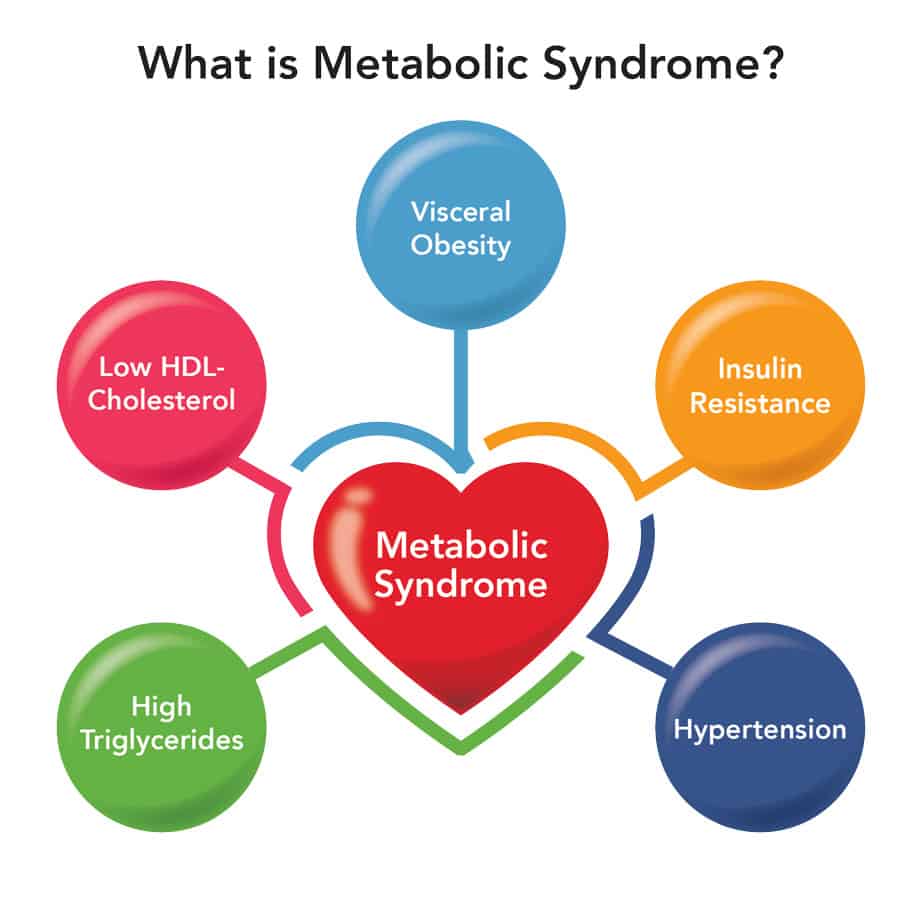Metabolic syndrome is less about any single diagnosis and more about how multiple imbalances in your body work together to raise your health risks. Key components include:
- High Blood Pressure: Puts extra strain on your heart and blood vessels.
- Elevated Blood Sugar or Insulin Resistance: Makes it harder for your body to regulate glucose properly.
- Excess Waistline Fat (Central Obesity): Closely tied to insulin resistance and inflammation.
- Abnormal Blood Lipids: High LDL (“bad”) cholesterol or triglycerides, and/or low HDL (“good”) cholesterol.
This combination can lead to chronic inflammation, oxidative stress, and other issues that undermine cardiovascular health.
Why It Matters for Heart Health
The higher your number of risk factors, the more likely you are to face complications like coronary artery disease, heart attack, or stroke. Metabolic syndrome can also speed up the progression of type 2 diabetes. By tackling these risk factors together, you can improve overall heart health and help prevent more serious problems down the road.
-
Nutrition and Weight Management
o Whole Food Focus: Emphasize fruits, vegetables, whole grains, lean proteins, and healthy fats to support stable blood sugar and healthy cholesterol levels.
o Portion Control: Even modest weight loss—5–10% of your current weight—can significantly improve blood pressure, insulin sensitivity, and lipid profiles.
o Targeted Support: Reno Integrative offers weight loss guidance, prescription options, and ongoing coaching to help you stay on track. -
Physical Activity
o Heart-Healthy Exercise: Moderate cardio (walking, swimming, cycling) helps burn excess fat and improves circulation.
o Strength Training: Building lean muscle mass can boost your metabolism and aid in long-term blood sugar control.
o Low-Impact Options: For those with joint issues or limited mobility, activities like yoga, Tai Chi, or water aerobics can be effective, too.
-
Stress Reduction & Self Care
o Mind-Body Techniques: Chronic stress can elevate cortisol, which in turn can affect both blood sugar and blood pressure. Consider meditation, deep breathing, or Reiki sessions to help keep stress in check.
o Adequate Sleep: Poor sleep disrupts hormonal balance and can increase cravings for high-sugar or high-fat foods, contributing to weight gain and unstable blood sugar levels.
-
Medical Management & Monitoring
o Regular Check-Ups: Monitoring blood pressure, lipid panels, and A1C tests helps track progress and catch issues early.
o Medication When Necessary: Certain prescriptions may be recommended alongside lifestyle measures to keep your risk factors under control.
o Collaborative Care: If you’re also facing other health challenges, like cancer, we can integrate non-toxic cancer therapies without compromising your work on metabolic issues.
-
Addressing Non-Toxic Cancer Therapies (As Needed)
o Holistic Support: Patients managing cancer and metabolic syndrome can benefit from immune-boosting therapies that help reduce inflammation and maintain energy.
o Immune Resilience: Non-toxic cancer therapies at Reno Integrative can complement your efforts to manage metabolic factors, fostering overall health and vitality.
Taking Charge of Your Health
Metabolic syndrome can feel daunting, but each risk factor is often manageable with a well-rounded strategy. By addressing your diet, exercise routine, stress levels, and any concurrent health issues, you can significantly reduce your odds of cardiovascular disease and other complications.
Ready to get started? Contact Reno Integrative to schedule a consultation. Our team is here to develop a personalized plan that suits your lifestyle, helping you break free from the cycle of metabolic risk factors and empowering you to take a proactive stance on your heart health. Together, we’ll work toward a future where you feel confident, healthy, and in control—one small step at a time.




